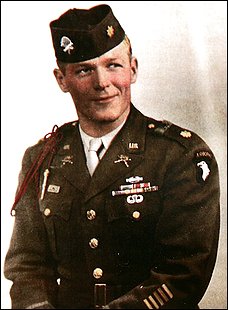On July 6th, 1944, the Normandy peninsula became the fulcrum of the struggle between the light of individual liberty and the dark forces of fascistic totalitarians. The warriors of liberty were common citizens of the democracies of Canada, Great Britain, and the United States, who locked themselves in mortal combat over the tight beaches nicknamed Gold, Sword, Utah, and Omaha, to establish a foothold on the continent of Europe that would never again be ceded to the totalitarians, and to whom the preservation of the tenets of liberty and individual freedom solely rest in their commitment and sacrifice. From the deadly beaches and hedgerows of Normandy, the race across France, the premature forward thrust of Market Garden, the steadfastness and horror of the climatic frozen battles of the Bulge, to the triumphant entry into Germany and the very home of the totalitarian at Berchtesgaden, a solitary warrior has come to optimize the selfless sacrifice of the millions who pushed themselves, looked out for each other, sacrificed all, and, with total victory in their grasp, humbly returned home to be simple citizens again.
In an assisted care living center in Pennsylvania last week , Richard Winter was called to final roll call at age 92, a victim of Parkinson’s disease. Richard Winter returned home from Europe after two years of continuous fighting, and took on the quiet role of father and simple laborer. Most would not know him as any form of hero in that he rarely talked of his experiences, and his family only noted his connection with the war with the intermittent process over the years of re-uniting with his fellow warriors. In routine life, he did not seek to be anything special, he only sought to be an acceptable member of his community and a good husband and father.

It would have stayed that way forever, except that Stephen Ambrose the historian, chose Richard Winters as the prime example of how normal men can be called to do extraordinary things, and how liberty at its heart, has always managed to have been successfully defended by those who recognize the best and only reward that fulfills their sacrifice is the preservation of that liberty. Stephen Ambrose saw in Richard Winters the spark of freedom that is precious to behold and immortalized his selfless acts, along with those of his comrades in Band of Brothers. It turned out that Richard Winters the citizen was also Captain Richard Winters, who earned the Distinguished Service Cross in the epochal twenty four hours of June 6th, 1944, leading his famed E company of the 101st Airborne division, to take the critical gun placements above Omaha Beach. In the two years of preparation and combat Winters rose from Private to Major on his extraordinary ability to inspire and lead men to do the difficult and at times horrifically dangerous actions on the pure basis of his courageous example and simple fairness. He saw it all, asked himself to do the intolerable, never took for granted the sacrifice of others, and in the end returned home, and there he stayed. And now he is home.
We must ask ourselves all the time. Where do such good people come from? How can those of us who live in freedom expect to continue to find such people among us, that keep it all possible – and yet we do. The generation of 16 million who served the United States in the war against tyranny are leaving us at the rate of thousands a week, and in the not too distant future they will all be gone. They will live on only in books such as those by Stephen Ambrose or mini-series by Tom Hanks and Steven Spielberg and will progressively seem to be fictional characters as stories of their heroic battles will become fainter memories increasingly mythologic, and other worldly.
They were, however, definitely real people, these defenders of the Ramparts. As they go to join their colleagues, we will take the time for a final salute and playing of taps to the warriors who braved all, exemplified by the shadowed scars of shells and guns above Normandy, and in the person of Richard Winters, who last week passed into the eternal pantheon of freedom’s heroes.
“Fading light dims the sight
And a star gems the sky, gleaming bright
From afar drawing nigh,
Falls the night.Day is done, gone the sun
From the lakes, from the hills, from the skies
All is well, safely rest;
God is nigh.Then goodnight, peaceful night;
Till the light of the dawn shineth bright.
God is near, do not fear,
Friend, goodnight.”
